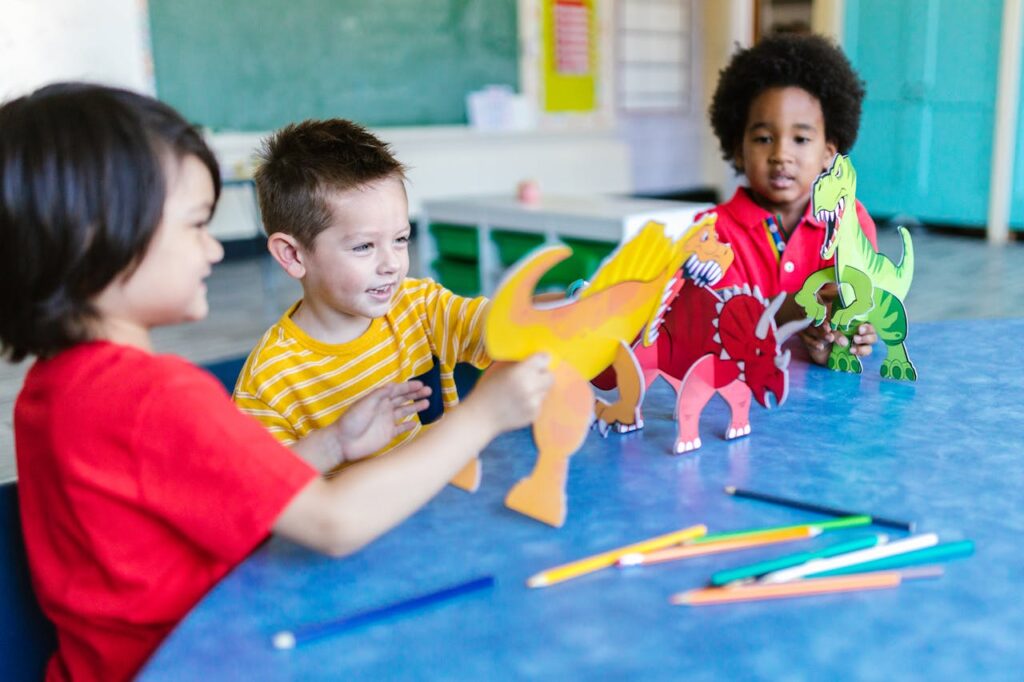Executive function skills are crucial building blocks for the early development of cognitive and social capacities. Large and small life skills, competencies, and behaviors that are the building blocks of executive functioning develop in early childhood. It is important for Early Childhood Educators (ECEs) to support the development of executive function skills and the healthy, developmentally appropriate emergence of these skills.
Executive Function skills are a complex interaction of three skills; Working Memory, Inhibitory Control (Self-Regulation), and Cognitive (Mental) Flexibility.
These skills working together are often compared to an air-traffic control system since combine being able to focus, hold, and work with information in mind, filter distractions, and switch gears similar to the way that an air traffic control system manages the arrivals and departures of dozens of planes on multiple runways. In most real-life situations, these three functions are rarely distinct but work together to produce competent executive functioning.
Working Memory
Working Memory is how we employ new incoming information, retain the data needed to complete tasks, and consider the characteristics of a new situation so that an effective response can be programmed. In adults, it’s how we remember phone numbers and new names. In young children, it is how they remember the placement of objects, simple directions, and plans.
Inhibitory Control (Self-Regulation)
Inhibitory Control (Self-Regulation) is how we master and filter our thoughts and impulses. It makes possible selective, focused attention and the ability to prioritize actions. This is how adults know what to say when and use context to shape our behaviors. In young children, it is learning to take turns, to express feelings in acceptable ways, and to listen to others.
Cognitive (Mental) Flexibility
Cognitive (Mental) Flexibility is adapting different behaviors to different situations and demands. It enables us to catch mistakes, fix them, and revise ways of doing things in light of new information. As adults, we change the direction of plans, and with new information, we understand how fluid thinking is. In young children, it is learning to adapt to a change in a play scenario, a change of plans, and to switch between tasks.

Scaffolding Executive Functioning
An excellent way for ECEs to scaffold Executive functioning skills is during Children’s “Free Play.” Children’s play is a wonderful environment in which to develop Executive Function skills when scaffolded by caring ECEs. When children plan for play-imaginary play or devise games together, they need to communicate with each other about role assignments and then remember them. They often need to listen to another perspective and consider another’s ideas.
Keeping track of these variables and finding an agreeable solution requires exercising emerging executive function skills. ECEs are integral in scaffolding this for their students. The child who cannot demonstrate sufficient executive competence may either be told what to do by others, get pushed out, or cause the play to fall apart.
Scaffolding children during play is the artful tension of letting the children work it out themselves and offering gentle support when needed. These are the same skills that help children master many academic tasks, get along with their peers, and be good classroom citizens. Children who routinely experience social interactions that provide these opportunities are more capable of resisting distractions, controlling their behavior and emotions towards others, and complying with adult requests.
For an extensive list of activities that support developing Executive Functioning skills, please see Enhancing and Practicing Executive Function Skills with Children from Infancy to Adolescence from the Center on the Developing Child. This publication has detailed activities to support the development of Executive Functioning Skills starting at six months of age.
ECEs are at the forefront of young children’s development of executive functioning. ECEs provide sensitive scaffolding for children in real-time situations giving them opportunities to direct their activities and develop emotional regulation.
Let’s nurture cognitive and social skills in early childhood together.
Elevate your understanding of early childhood education and child development with my engaging preschool education workshops tailored for both teachers and parents. These workshops provide valuable insights, practical strategies, and effective tools to enhance your role in nurturing young minds. Whether you’re an educator or a parent, these sessions aim to empower you with the knowledge and skills essential for fostering a positive learning environment. Dive deeper into the world of preschool education and child development by exploring my workshop offerings. For more valuable content and updates, follow me on Instagram and connect with me on LinkedIn. #EarlyYearsConsult
#EarlyChildhoodEducation #ChildDevelopment #PreschoolWorkshops #EducatorServices #ParentingTips #LearnAndGrow

